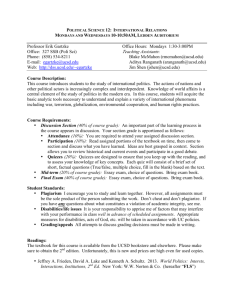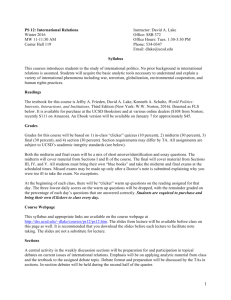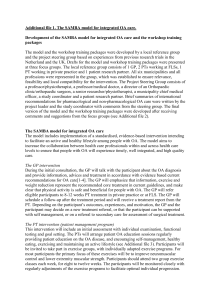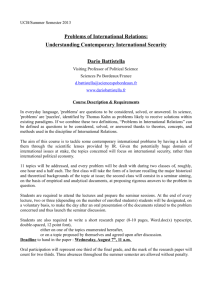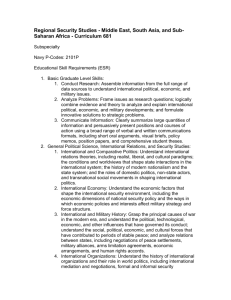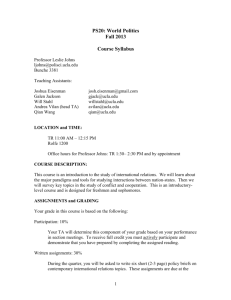International Politics - Department of Politics, New York University
advertisement
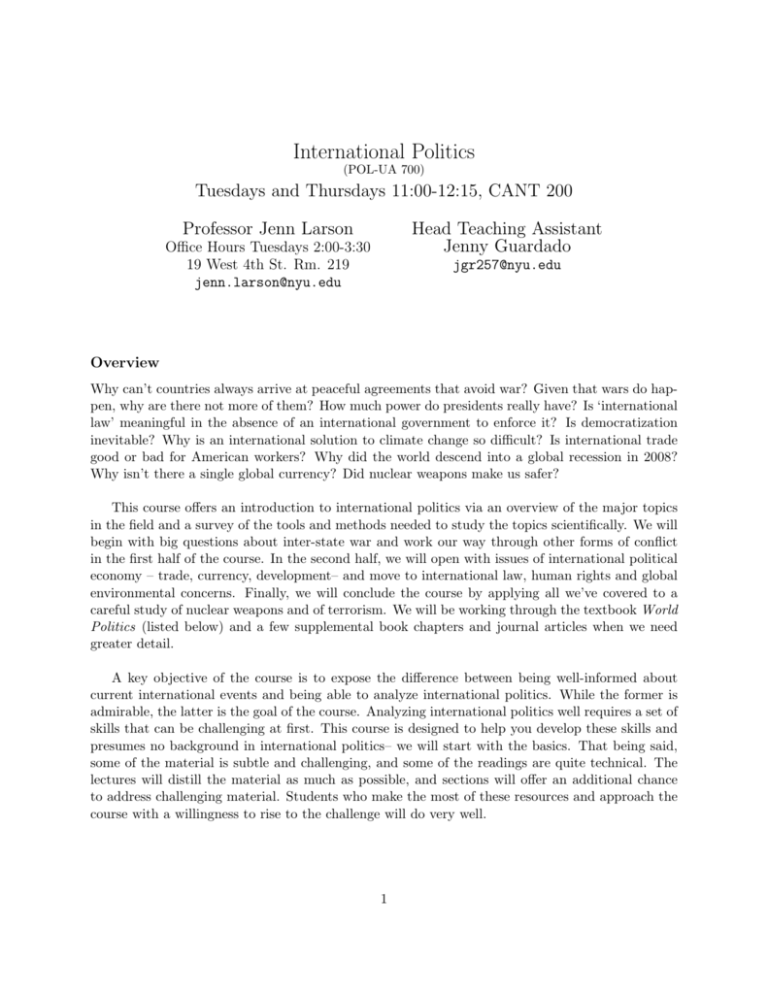
International Politics (POL-UA 700) Tuesdays and Thursdays 11:00-12:15, CANT 200 Professor Jenn Larson Head Teaching Assistant Jenny Guardado Office Hours Tuesdays 2:00-3:30 19 West 4th St. Rm. 219 jenn.larson@nyu.edu jgr257@nyu.edu Overview Why can’t countries always arrive at peaceful agreements that avoid war? Given that wars do happen, why are there not more of them? How much power do presidents really have? Is ‘international law’ meaningful in the absence of an international government to enforce it? Is democratization inevitable? Why is an international solution to climate change so difficult? Is international trade good or bad for American workers? Why did the world descend into a global recession in 2008? Why isn’t there a single global currency? Did nuclear weapons make us safer? This course offers an introduction to international politics via an overview of the major topics in the field and a survey of the tools and methods needed to study the topics scientifically. We will begin with big questions about inter-state war and work our way through other forms of conflict in the first half of the course. In the second half, we will open with issues of international political economy – trade, currency, development– and move to international law, human rights and global environmental concerns. Finally, we will conclude the course by applying all we’ve covered to a careful study of nuclear weapons and of terrorism. We will be working through the textbook World Politics (listed below) and a few supplemental book chapters and journal articles when we need greater detail. A key objective of the course is to expose the difference between being well-informed about current international events and being able to analyze international politics. While the former is admirable, the latter is the goal of the course. Analyzing international politics well requires a set of skills that can be challenging at first. This course is designed to help you develop these skills and presumes no background in international politics– we will start with the basics. That being said, some of the material is subtle and challenging, and some of the readings are quite technical. The lectures will distill the material as much as possible, and sections will offer an additional chance to address challenging material. Students who make the most of these resources and approach the course with a willingness to rise to the challenge will do very well. 1 Requirements Section Participation: 10% Sections will meet once a week and are offered to help clarify lecture material and occasionally introduce new material. Students are expected to attend and participate in section, and are responsible for material covered in both lecture and section. Short Assignments: 20% The course covers a lot of information. Short assignments are intended to clarify key concepts, offer practice in applying course material before exams, and facilitate discussion in section. There will be one problem set (due in week 3), three short analyses of films (due in weeks 5, 13 and 15), and one current event memo (due in week 11). Details will be distributed in lecture and/or section. Midterm: 30% An in-class midterm will be given on Thursday, March 13th. There will be a review session held during class time the Tuesday immediately prior, March 11th. Final: 40% A final exam will be held on Thursday, May 15th at 10am. The time and place can be confirmed on the Registrar’s website. There will be a review session held during class time on the last official meeting of class, Thursday, May 8. Additional course information will be distributed in lecture, in section, over the email list, or on the course website. Course Materials There are two required books for the course. The bulk of the course readings will be from the book (referenced as FLS below): • Jeffry A. Frieden, David A. Lake, and Kenneth A. Schultz. World politics: Interests, interactions, institutions. WW Norton New York, 2nd edition, 2012. The book is available in the NYU bookstore, or on amazon.com. We will also be reading most of: • Joseph M Siracusa. Nuclear weapons: A very short introduction. Oxford University Press, 2008. The book is available in hardcopy or as a Kindle ebook on amazon.com. Additional readings will be available on the course website, accessible with your NYU ID. There will also be short assignments which will require viewing the following three films out of class: • Seven Days in May. Dir. John Frankenheimer. 1964. 2 • • Judgment at Nuremberg. Dir. Stanley Kramer. 1961. Dr. Strangelove or: How I Learned to Stop Worrying and Love the Bomb. Dirs. David Naylor and Stanley Kubrick. 1964. The films are available for purchase on Amazon.com, for rent on either amazon.com or vudu.com, or can be rented in hard copy (not streamed, as of Jan 2014) from netflix.com. Plan ahead to ensure you will have access to a copy in time for the short assignments. Late Policy Since short assignments are meant in part to facilitate discussion in section, no late short assignments will be accepted. An assignment is ‘late’ if it is submitted past the due date and time, or if it is submitted in an improper format. Exceptions for personal emergencies will be assessed by the teaching staff on a case-by-case basis. 3 Schedule of Readings (subject to additions and substitutions) Week 1: Introduction 1/28/14 : Course introduction and logistics No readings 1/30/14: Studying international politics scientifically • FLS Introduction • FLS Chapter 1 Week 2: Studying Strategic International Interactions in a Rigorous Way 2/4/14: Interests, interactions and institutions • FLS Chapter 2 2/6/14: Quick intro to game theory • FLS Chapter 2 Appendix (p. 74-79) • Chapters 6-8 (p. 119-199) of: Avinash K Dixit. Thinking strategically: The competitive edge in business, politics, and everyday life. WW Norton & Company, 1993. Week 3: War [PROBLEM SET DUE IN THIS WEEK’S SECTION] 2/11/14: Why are there wars? • FLS Chapter 3 • James D. Fearon. Rationalist explanations for war. International Organization, 49(3):379–414, 1995. 2/13/14: Why are there wars? cont. No new readings Week 4: Domestic Politics and War 2/18/14: Two-level games • FLS Chapter 4 • Robert D. Putnam. Diplomacy and domestic politics: The logic of two-level games. International organization, 42(3):427–460, 1988. 4 2/20/14: Democratic peace • Bruce Bueno De Mesquita, James D Morrow, Randolph M Siverson, and Alastair Smith. An institutional explanation of the democratic peace. American Political Science Review, pages 791–807, 1999. • Chapters 1 and 2 (p. 1-48) in: Bruce Bueno De Mesquita and Alastair Smith. The dictator’s Handbook: Why Bad Behavior is Almost Always Good Politics. PublicAffairs, 2011. Week 5: Alliances, Civil War [MOVIE ASSIGNMENT 1 DUE IN THIS WEEK’S SECTION] 2/25/14: Alliances and international institutions • FLS Chapter 5 2/27/14: Civil war • FLS Chapter 6 first half, p. 214-242 • James D Fearon and David D Laitin. Ethnicity, insurgency, and civil war. American political science review, 97(1):75–90, 2003. Week 6: A Micro View of Conflict 3/4/14: Conflict and cooperation in weak states • James D Fearon and David D Laitin. Explaining interethnic cooperation. American political science review, pages 715–735, 1996. • David Skarbek. Self-governance in san pedro prison. The independent review, 14(4):569–585, 2010. • Chapter 2, “The Pacification Process” (p. 31-58) in: Steven Pinker. The better angels of our nature: Why violence has declined. Penguin. com, 2011. 3/6/14: Psychology and personalities • Jack S Levy. Prospect theory, rational choice, and international relations. International Studies Quarterly, 41(1):87–112, 1997. • Allan Dafoe and Devin Caughey. Honor and war: Southern us presidents and the effects of concern for reputation. In Annual Meeting of the International Studies Association, volume 25, 2012. 5 Week 7: Midterm Week 3/11/14: Review session 3/13/14: In-Class Midterm Week 8: Spring Break 3/18/14: No Class 3/20/14: No Class Week 9: International Political Economy 3/25/14: Trade • FLS Chapter 7 3/27/14: International financial relations • FLS Chapter 8 Week 10: International Political Economy 4/1/14: International monetary relations • FLS Chapter 9 4/3/14: No Class Week 11: Development [CURRENT EVENT ASSIGNMENT DUE IN THIS WEEK’S SECTION] 4/8/14: The long term • FLS Chapter 10 • Daron Acemoglu and James A Robinson. The colonial origins of comparative development: An empirical investigation. The American Economic Review, 91(5):1369–1401, 2001. 4/10/14: The short term • Chapter 1 (p. 1-29) in: Robert H Bates. Markets and states in tropical Africa: the political basis of agricultural policies. University of California Pr, 1981. • Chapters 1 and 2 (p. 1-40) in: Abhijit V Banerjee and Esther Duflo. Poor economics: A radical rethinking of the way to fight global poverty. PublicAffairs Store, 2011. 6 Week 12: International Norms 4/15/14: International law • FLS Chapter 11 4/17/14: Human rights • FLS Chapter 12 Week 13: Global Environment, Nuclear Weapons [MOVIE ASSIGNMENT 2 DUE IN THIS WEEK’S SECTION] 4/22/14: Global environmental issues • FLS Chapter 13 4/24/14: Nuclear weapons • Chapters 1-6 (p. 1-107) in: Joseph M Siracusa. Nuclear weapons: A very short introduction. Oxford University Press, 2008. Week 14: Nuclear Weapons, Terrorism 4/29/14: Nuclear weapons cont. • Chapters 1, 2, and 6 (p. 3-81, 175-214) in: Scott Douglas Sagan and Kenneth Neal Waltz. The Spread of Nuclear Weapons: An Enduring Debate. WW Norton & Company, 2013. 5/1/14: Terrorism • FLS Chapter 6 second half, p. 242-263 • Ethan Bueno De Mesquita. The quality of terror. American Journal of Political Science, 49(3):515–530, 2005. • “Nuclear Proliferation and Terorism” (p. 43-61) and “Pakistan” (p. 65-75) in Bob Graham and James M Talent. World at risk: the report of the commission on the prevention of WMD proliferation and terrorism. Vintage, 2008. Week 15: Wrap-up [MOVIE ASSIGNMENT 3 DUE IN THIS WEEK’S SECTION] 5/6/14: Bringing it all together 5/8/14: Review session 5/15/14 (Thursday): Final Exam, 10:00a, location TBD by the Registrar. 7
